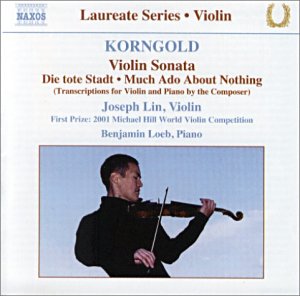Compilation:
A recital of music by Erich Wolfgang Korngold (1897-1957)
Works and transcriptions of his own works for violin and piano:
Much Ado About Nothing Suite for Violin and Piano (1918 arr 1920)
Sonata for Violin and Piano (1912)
'Ich ging zu ihm' from Das Wunder der Heliane (1923-27)
Serenade from Der Schneemann (1910)
'Tanzleid des Pierrot' and 'Marietta's Lied' from Die tote Stadt (1916-20)
Caprice Fantastique (1932)
Joseph Lin (violin) and Benjamin Loeb (piano)
Available on: NAXOS 8.557067
Running Time: 72:06
Crotchet Amazon UK

Also reviewed this month: Compilation Recital: Erich Wolfgang Korngold: TDK DVD Video DV-VTASO-EUR
Korngold's lush, romantic, youthful music is the ideal vehicle to show off the considerable virtuoso and expressive talents of Joseph Lin featured as the Laureate violinist in this new 'Naxos Laureate Series' release. The young Lin has already successfully toured across the globe and picked up an impressive list of prizes including the top place in the 2001 Michael Hill World Violin Competition.
The main work in the programme is Korngold's Sonata for Violin and Piano. Spanning some 36 minutes, it is an immense achievement for a youth in his mid-teens, the melodic writing so complex and sophisticated that it sounds much bigger, almost as though one is listening to an orchestral composition. As Richard Whitehouse says in his notes, Korngold, like Richard Strauss, clearly identified the violin with the human voice, its material lyrical, stirring and evocative; and the piano writing is no less effective, passionate, poetic and expressive. Interestingly, in this context, pianist Benjamin Loeb, making an ideal partner for Lin, is also an accomplished orchestral conductor. The opening movement, marked, Ben moderato, ma con passione, appeals directly to the senses, romantic, passionate, it yearns and pleads and is occasionally defiant, disturbing and shadowy. The second movement combines a cavorting scherzo, that bounces and cavorts with swashbuckling swagger, with a Trio that has a waltz tune, marked with deepest feeling, which comes from the Vier kleinen fröhlichen Walzern for piano. The following Adagio's passion is no less deeply felt, while the concluding Allegretto is an engaging sequence of variations on a Korngold song, Schneeglöckchen (Snowdrops).
Korngold's charming, outgoing Much Ado About Nothing music transfers very well to violin and piano. In the opening 'Maiden in the Bridal Chamber' Lin and Loeb wittily suggest the bride's sentimental expectancy and coy modesty. The comic, grizzled and argumentative pomposity of 'Dogberry and Verges' is equally well observed while all the sylvan romanticism of the 'Garden Scene' is nicely evoked. The short suite is rounded off with a vivacious 'Masquerade'.
The shorter pieces all shine. Those favourite melodies from Die Tote Stadt, Pierrot's and Marrietta's Lieds sound fresh and gorgeously expressive – just listen, for example to the piano part as it so evocatively sets the scene along the Bruges canals for the Pierrot Lied and how Lin can so touch the heart in both pieces. A darker hued beauty is the tragic, melancholic, resigned music from Das Wunder der Heliane. The 'Serenade' from Der Schneemann is all sweet sentimentality – an amazing feat from boy genius, Korngold, barely into his teens. Finally another fine virtuosic and wonderfully expressive rendering of the Caprice Fantastique; this is Korngold's arrangement of his own Wichtelmännchen (The Goblins) from his 1910 set of Fairy Tale Pictures. The mischievous, ill-tempered, character of the goblins and their awkward gait is quite brilliantly evoked in a marvellously witty and sardonic performance.
Excellent virtuosic and expressive performances of some of Korngold's most enchanting music.
Ian Lace
5
Return to Index